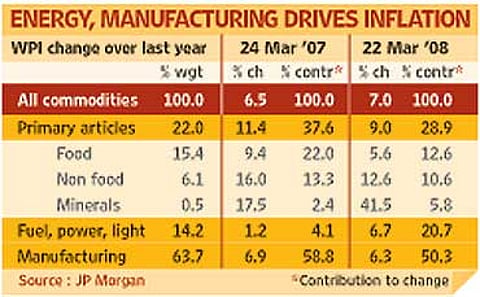Steel Your Nerves
After foodgrain and energy fuel prices, the next battle focuses on metals

As minister of state for PMO Prithviraj Chavan points out, "India has a better record of managing inflation compared to similar developing countries, including China. That's not to say we're happy with the situation, which is due to pressures from supply side problems." The committee of secretaries is expected to submit its report to the cabinet committee on prices when it meets next week. While admitting that price curbs could be a detrimental step for the steel industry, decision-makers are exploring it regardless. Prime Minister Manmohan Singh too admitted that there were pressures, but returning to an era of 'blind controls', he said, is not the answer.
The concern with cement is that while prices are steady at the moment, they could rise. In the case of steel, the fear is we could be staring at runaway prices if no action is taken. Thus, one of the options is to set up a regulator (see interview with steel minister Ram Vilas Paswan) to monitor global trends in iron ore and coking coal prices, which have jumped several-fold in the last one year. Clearly, this will hit steel producers. Commerce secretary G.K. Pillai is blunt: "We are looking for a composite solution, which could hit everyone. The consumers are already hit by high prices. The steel sector will have to suffer a bit and live with reduced profits."
There are other options, too. The alternatives being explored, after talking to industry groups, range from further lowering import duties on raw materials, making exports less attractive, rolling back the hike in railways freight tariff, to banning forward trading in steel and other sensitive commodities. The government has also not ruled out bringing steel under the Essential Commodities Act, though this is doubtful as the measure would be seen as a retrograde one.
The government is taking no chances, as the high cost of hot-rolled steel is affecting many downstream sector industries, with many facing the threat of closure. HR steel constitutes 70 per cent of the cost of making cold-rolled coils, pipes and tubes. Moreover, there's competition from China, where HR steel prices are $120 a tonne lower than in India. "In the last one year, the HR steel price has been hiked six times without any reference to the price monitoring committee set up by the government," complains an upset S.C. Mathur, executive director of the Cold Rolled Steel Manufacturers Association.
Commodity experts attribute the global bullish trend in metals to the devaluation of the dollar. In part, it is attributed to the cartelisation by a few mineral and coking coal producing countries to capitalise on the growing mismatch between demand and supply. Says Sanjay Kaul, director and CEO, National Institute of Commodities Research: "In the case of commodities like gold and silver, where prices are globally settled, India cannot really do anything."
Meanwhile, the situation looks slightly better after last week's panic over the political hot potato of foodgrains. Allaying fears of major damage to the wheat crop due to rains ahead of the harvest, agriculture commissioner N.B. Singh says, "Preliminary assessment reveals there is some localised damage in around 30,000 hectares out of the 3.4 million hectares total wheat area. Even in the affected areas, the damage is only 10-20 per cent." In fact, the government is maintaining estimates of wheat production reaching 75 million tonnes, which will hopefully ease domestic supply and price pressures. The prognosis is good in the case of edible oil. And while the mustard crop has suffered some loss due to the unfavourable weather conditions, soybean production is expected to be 9 million tonnes, one of the highest yields ever.
But steel remains a concern. At 7 per cent, India's steel production growth is not keeping pace with the growth in demand (13 per cent). Internationally too, there is a shortage of steel, with high inputs adding to cost pressures. India's policy of allowing exports of iron ore without meeting domestic demand is being blamed in part for the present situation. Whatever be the reason, expect more tussles between the government and the steel industry. The unfortunate truth is that somebody will get hurt when the real boxing begins.
Tags